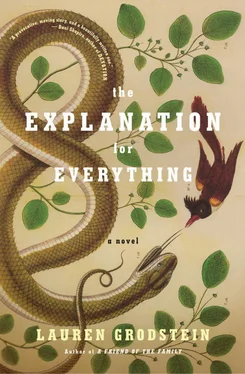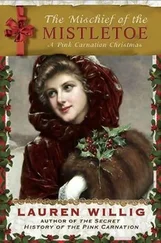This feeling is especially strong, I believe, among those who have lost their children. As it should be, I suppose. This is why I do not begrudge the Lims their thirteen-million-dollar settlement. They do not want my money. They want their daughter back. The money is a poor substitute, but it is all I can give them.
So now what?
I’m on eighteen pills a day and I take some in the morning and some at night, except for those mornings when I just can’t face it or those nights when I’m too damn tired. The pills are keeping me alive unless they’re not—unless what’s keeping me alive is just me being feisty, which I’ve been told I am. Feisty. This is a word people use for pets and old people, and that’s fine. Although I’ve never been anybody’s pet.
Listen, Anita. I was so panicky at the thought of losing you that I never told you the things I should have. What should I have said? That love is important, of course. That if you have found this man who you think is a good guy, and who makes you happy, and will love you and take care of you and father your children, yadda yadda (and even now, here I am making fun, yadda yadda, I can’t help myself). No, really, Anita—if this man loves you, and you love him, then you are a lucky woman, and congratulations to you both.
You should have children. Many children.
And also! Listen, Anita—listen to me. Right now you may think that you have discovered the truth, and that the truth isn’t in a laboratory like you always thought, but the truth is in a chapel somewhere, or a holy book. Okay, fine. You’re wrong, but fine. Believe in that chapel or that holy book or the words of your husband but just keep a little part of your brain (your heart, your intestines, take your metaphor) and leave it open to doubt. Or to wonder. To curiosity. Ask yourself, one day (the kids are grown, the husband is in his study, those awful parents of yours are memories in a photo album), how did this God of mine put life on earth? Through what mechanism? Was it really as simple as his Word, or was perhaps the Word a more complicated story?
I am sorry for what I did to you. I am sorry for the world, of course, and sorry for myself, but mostly I am sorry that I caused you such despair. That was never, ever my intention.
I know there is no heaven but now that I am older I have become able to conjure one up. This, they say, is one of the hazards of growing older, but I don’t care. I don’t care that my mind is failing, and there are long periods these days that I spend quite happily back in my childhood, eating my mother’s cooking, going to yeshiva, playing stickball with my friends. I liked yeshiva. People say I didn’t, that my life’s work was in the main a rejection of a religious childhood, but this is quite untrue. I liked my schooling, I liked the rabbis, I liked some of the fairy tales they told us. I didn’t like our angry God very much but Adam and Eve, them I found appealing. Abraham and Isaac. Poor old Moses. Those stories were good stories.
And I loved my mother and father, my brother and sisters, my grandparents, our apartment in the Bronx, the foyer I slept in, the elevator with the gate and the porthole window, the cousins in every neighboring building, the pretty girls, the overactive radiator in the winter and the nonexistent air-conditioning in the summer. I loved them all; I miss them all.
Ah—I’ll stop! Although I was just there this morning.
So yes, time travel is one of the small graces of growing older, and within that time travel is, perhaps, a little bit of clairvoyance, the ability to see what’s on the other side, or to imagine it with a certain amount of anticipation. I imagine you on the other side, Anita. You look exactly as you did when I knew you. You are small and serious. You are always at a computer. When you realize something enormously important, when you make a crucial connection, when you win two hundred thousand dollars because the world catches on to you—you let escape the smallest smile. Such a small, rare smile! I loved seeing it. Anita, if I’d only had daughters of my own, perhaps you would have been spared.
I kept up with Charles and your family for as long as I could bear. The parents are back in Korea. The brother and the wife are in Texas with many children. Charles is married. After the settlement, the parents decided—please do smile at this—to give the bulk of my money to his church.
And now the end of the day is getting closer and I have my pills to take, or not to take, as I decide. The man who owns this house has been worried for me and has started to send in a nurse, a nosy black lady I very much like except when she nags me too much about the meds. She cooks me Haitian food, fried pork, which in these sentimental days of mine reads a bit like trayf, so I eat it with gusto. It is spicy and soft and agrees with me. She is very pretty, this nurse of mine, but I can never remember her name. It is Agnes or Angela or something with a French accent. I never can remember, but no matter.
She does not mind if I call her Anita.
This was the last of the numbered manuscript pages. Stapled underneath, Andy found this note:
I expect it will not surprise you, Andy, that I am dead now.
He had to read the line three times and still it read like a joke. A terrible sort of practical joke.
How do I know that I am dead? Because poor Watson (a young lawyer and a former student of mine—and incidentally what does it say about the academic job market that biology students now turn to law school?)—poor Watson was under instructions not to send this mawkish piece of bullshit to you until I was good and gone. And since you’re reading this, ergo sum, etcetera. I have been cremated, my ashes sprinkled spitefully by my poor dear Watson (I presume) about and around the Princeton biology department. Fuck ’em.
He read this again too. Dead? He wasn’t dead. He was so viscerally alive! Everything Rosenblum had said, had taught him—his words—he was alive!
Dead! I promise you it’s the truth.
Should he even keep reading this? He didn’t need to keep reading this. Tomorrow would be another spring day. The world spinning. The lilacs blooming. The hawks circling. Hank Rosenblum, alive in Montauk.
As for the particulars—well, I died sometime after you applied for tenure, Andy, and I’m guessing sometime before the end of this summer. It’s now July of 2011 and I’m feeling like shit, I don’t mind saying. The end can’t possibly be near enough. Congestive heart failure has me wheezing like a goddamn accordion, along with some obstructive lung problems that I knew were coming at me, but fuck it, my pipe was a comfort that sullen old age was never gonna be. So here I am, dying. Or here I’m not, since now I’m dead. I’m a ghost, Andy! But don’t be scared.
Don’t be scared. Andy took a walk around the room. Went to the sink in the bathroom and splashed water on his face.
So fine, you might be wondering why I’m sending you all this right now, why of all my former students and dear ones, you (and you alone, Andy—no sibling rivalries for you, my friend!) received this missive, and what I expect you to do about it now that it’s in your care. Well, to answer the second and easier question first: nothing. You don’t have to do anything with this little book of mine. These pages are the smoke and emissions from a dying car, an unquiet mind.
As for why you: well, of course I was always very fond of you, Andy. And though you might argue that I was very fond of all my students (untrue, but it makes me seem like a better professor if you say so) I also never quite got over the idea that I did poorly by you. I knew about your wife dying, Andy, and that you were alone with those two tiny daughters, and I never did anything about it. I could have used some of the few contacts I had left, maybe arranged a postdoc somewhere. Something, anyway, to have kept you somewhat whole and sane. The sort of thing that a friendly and interested mentor would have and should have done. But I was still grieving for Anita then, in the worst part of the grief, and I wasn’t able to think about anybody but myself. I assume you know the feeling, Andy, but that doesn’t make it excusable. As long as we’re on this earth we should do right by other people. Especially those who have been good to us. You were a nice kid, a loveable kid, and you had a bright future ahead of you. And now you’ve ended up in that shithole of a college. Well. At least you’re not a lawyer.
Читать дальше












